
На сайте используются cookie файлы
The site uses cookie files
Данный сайт имеет возрастное ограничение!
This site has age restrictions!
Я подтверждаю, что мне, увы, уже давно исполнилось 18 лет
As a wine producer for almost 40 years, I had the opportunity to be a part of the modern Greek wine history, that is closely related to the presence of the Greek Wine Federation. I felt I had a duty to offer to my colleagues and to the Greek wine, a small token of appreciation of the many things I learned from them throughout all these years. My priorities included creating and developing regional councils for the protection of PDOs, modernizing the Greek legislation governing the wine industry, and ensuring growth of the national vineyards; however, unexpectedly, it was enforcement of the excise duty on wine and a fight against it on both political and legal grounds, has become the priority of my presidency.
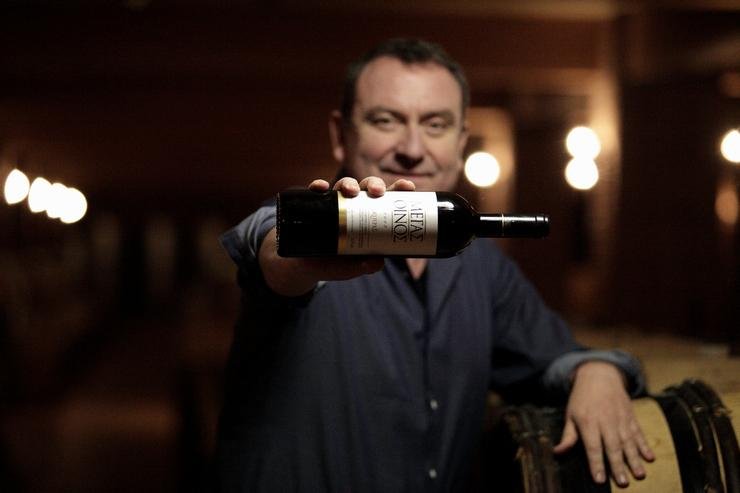
Please tell our readers, how nomination of candidates for such a position took place. What is the voting process, how many applicants? Who are judges?
The election of candidates to hold the positions as members of the administrative council takes place every two years at the general assembly meeting . The council consists of 11 members. The 5 of them represent the 5 districts of Greece: North Greece, Central Greece, Peloponnese, Crete, and Aegean islands. The members of each district are to cast their votes for or against these 5 candidates. As to the remaining 6 candidates, all members of the Federation are entitled to cast their votes for or against them. The administrative council consists of the candidates who got [the required number of votes] and their positions in the council are decided by the voting during the first meeting after the general assembly meeting.
The 120 wineries, which are members of the Federation, are the companies with a long history. The last decade we are very happy to witness more and more new wineries starting their business.
How much time do you spend, performing your presidential duties? How do you manage to combine this work with your global project Domaine Skouras?
Being the President of the Greek Wine Federation is a challenging assignment that needs time, concentration, energy, patience, knowledge, passion, and ambition. The same things are required when I am working in the winery. Coping with both duties would be impossible without the support I get from my colleagues in the winery and the Federation. Thankfully, the Federation has Prof. Theodore Georgopoulos as General Director, who is an international expert in the wine law, with a deep knowledge of the area, which he has gained while collaborating with the Federation for many years. The administrative staff and experts working for the Federation are also of great help in achieving our goals.
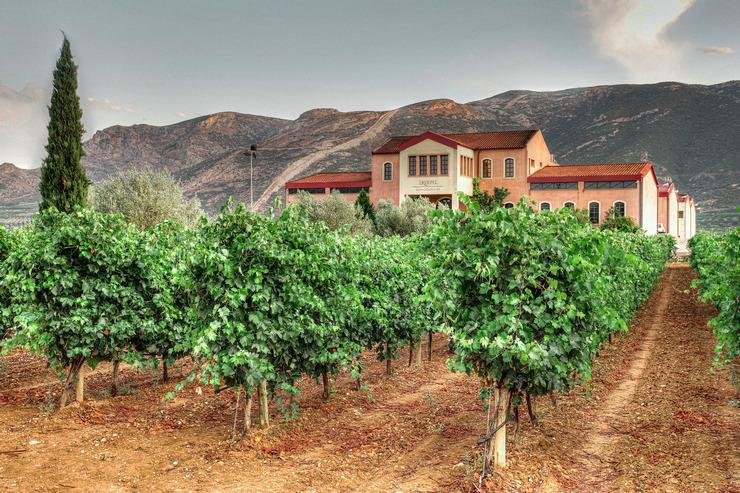
Domaine Skouras
What are the main responsibilities of the President of the Greek Wine Federation and the main functions of the Federation?
The Greek Wine Federation represents all private Greek wineries, promotes the Greek wine globally, and elaborates laws governing the wine industry. The President and the administrative council have been working in the interests of the Greek winemakers and for the purpose of ensuring a high quality of the Greek wine. At the same time, I am working with an amazing Board, composed by 10 colleagues who have gained a vast experience, have fresh ideas and are sharing our common dream for the Greek Wine’s future. A real dream team! I have been enjoying tremendously working with them for 6 years.
The Federation has about 120 members. What is the process of accepting new members, how long does it take and what are the terms of membership?
The 120 wineries, which are members of the Federation, are the companies with a long history. The last decade we are very happy to witness more and more new wineries starting their business.
A winery that intends to become a new member has to file an application with the secretary of the Federation. This application needs to be also signed by two current members of the Federation. The Board has to approve the application, whereas it is up to the General Assembly to approve membership during its annual meeting. In terms of criteria, the most fundamental one is an absolute respect to the wine laws and promotion of the values of the Federation.
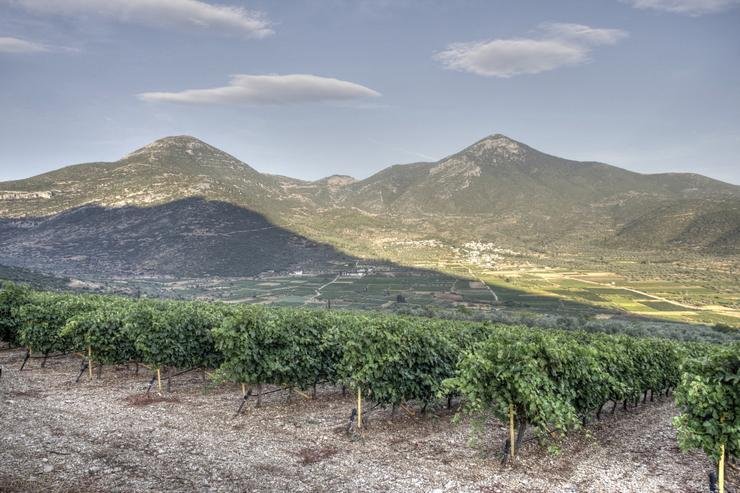
What does the membership in the Federation grant? Please list the main benefits. Perhaps you keep in touch with some international organizations?
The Greek Wine Federation is the official organization for private Greek wine industry. It is a member of the CEEV (“Comité Vins”), the largest European organization defending the wine industry’s interests. Being a member of the Greek Wine Federation means that you get continuous updates about everything that is going on in the wine industry and get support if you face a problem. As concerns the issue: how important the Federation is, it may be proved by the fact that it managed to offer real legal help to its members when the excise duty was suddenly imposed on wine and to resolve serious problems that our members were facing.
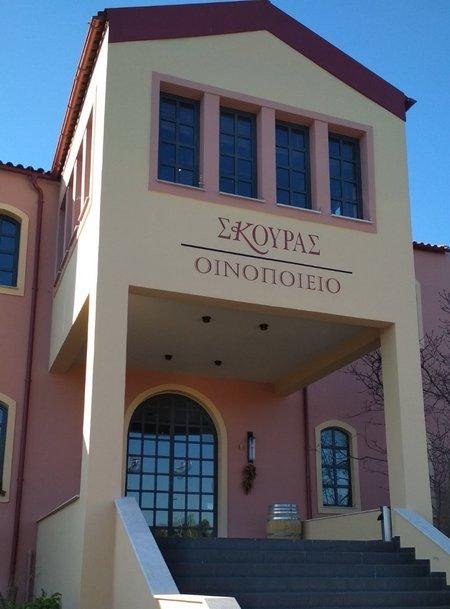
Studying the information about you, we came across the fact that, as it turned out, you did not plan a winemaker’s career, but wanted to become a doctor. However, when time came to enter the medical university, doubts began to plague you and as a result you missed the deadline for passing the exams… Moreover, having changed your mind about the future, you entered the Faculty of Oenology in Dijon, Burgundy. What made you change your profession so dramatically? Who opened the world of wine for you?
Actually, after I had arrived to France for my Chemistry studies, my teacher of French introduced me into the French culture and he started with vines, wines, and Chateaus. This enchanted me. I fell in love with wine and I thought that Greek wine would have very good prospects. It was not a common secret that Greece was very much related to the wine production, though for many years this relationship was neglected. The idea of making quality Greek wine stroke me as a lightening and the next day I went to the university and changed my major to Oenology studies.

After six years of education, you created your first wine project after taking a bank loan. If it’s not a secret, how much money did the Skouras winery have at the very start and how quickly did the project pay off? Tell us about your first winemaking experience. What prompted you to take such a risky financial step?
Before establishing my own winery, I had gained experience in other wineries and that resulted in my understanding, what were the correct steps that had to be taken to start my business. Taking a bank loan was a risk, of course, but this is what a businessman has to deal with on a daily basis.
The idea of making quality Greek wine stroke me as a lightening and the next day I went to the university and changed my major to Oenology studies.
After you had returned to Greece and started a small production, how did your business go? What difficulties did you face, and who supported you?
All new businesses usually face difficulties at the very start. My greatest difficulty was to balance my wine mentality with Greek market’s needs. Not only did I have to be a good oenologist, but a good salesman, too. Throughout all these years, my wife and I have been working together in order to be achievers in this field.
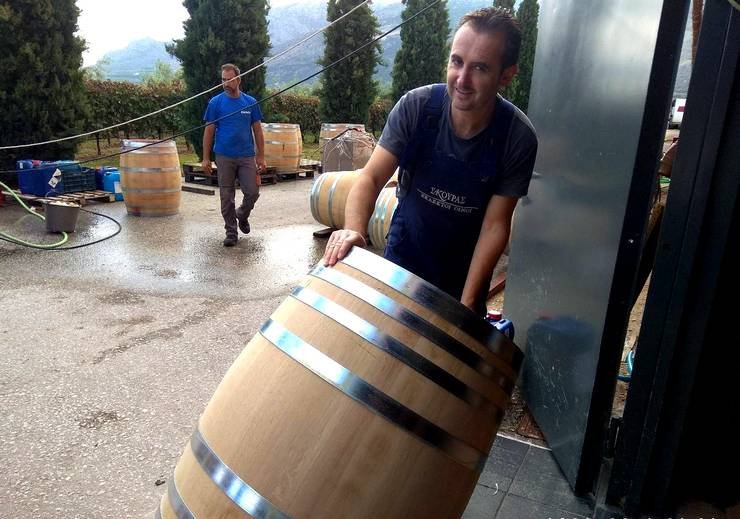
Who tasted your first wine and what were the professional reviews?
I can recall many reviews about my first wine but the most important was the one dated back to 1993. This happened when the first wine competition ever took place (it was called “Wine America”): my first wine Megas Oenos was considered to be the best in its category, having won a gold medal. The panel of judges was chaired by Mrs. Mary Mulligan (MW) and the reviews were very flattering. This was my very first medal.
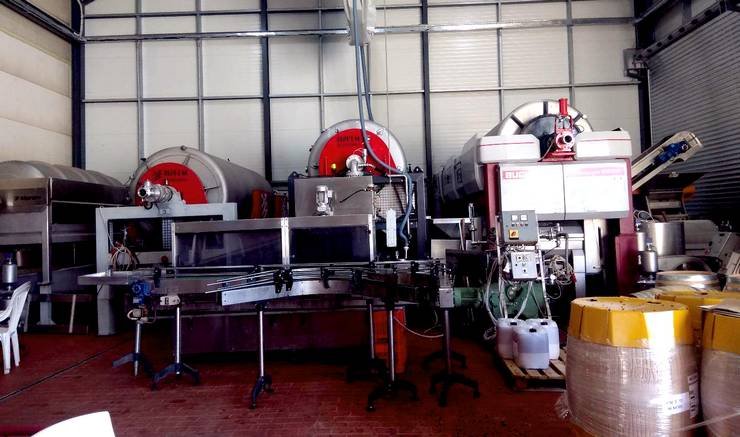
Today, you are called a pioneer of the modern era in the Greek winemaking. You were one of the first who introduced the innovative technologies and practices in winemaking. When the Drinks+ team visited Domaine Skouras in Argolis, near ancient Argos, we were impressed by the technical capabilities and innovative technologies to create terroir wines of the highest quality. Tell us, please, how you choose the equipment: who gets the information about new products, who supplies it? What funds are invested into the production as a percentage of profit?
Every year, we spend about 20% of our profits in order to improve the facilities and machinery that will fulfill our needs and help to maintain our standards. Depending on our needs, we have been collaborating with the companies providing us with the best machinery. We are trying to get updates about all technological evolutions in the field of winemaking and we love dreaming and experimenting with wine.
How often do you replace the equipment and where do you acquire technical innovations? What are the most recent acquisitions that you are particularly proud of?
Replacement of the equipment depends on the winery’s needs. Usually, our technical innovations come from France or Italy. Recently, we have added a new machine that helps us avoid oxidation while we press the grapes by using nitrogen.
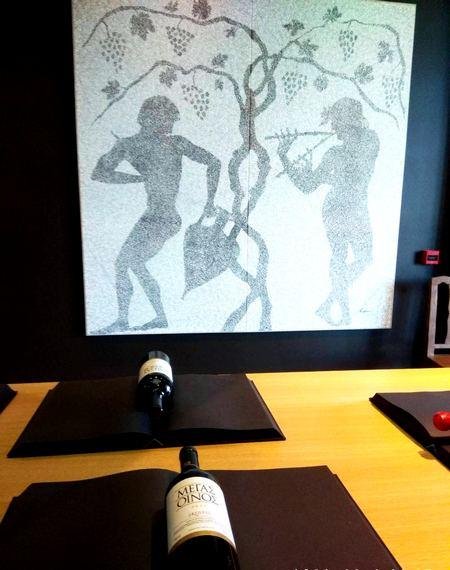
Domaine Skouras winery is one of the leaders among Greek wine companies, especially, as we presume, in the field of advanced technologies applied in winemaking. For example, your Peplo Rose – tell us about this blend: whose idea was that to create this wine? Are there any new ideas regarding other blends?
In our winery, we are proud to collaborate with a team of talented oenologists and viticulturalists and we have an R&D department conducting researches related to such new ideas. These past 40 years, after numerous experimental vinifications, we have gained a vast experience with our grape varieties. At the same time, collaborating with young scientists gives as an excellent combination of experience and enthusiasm.
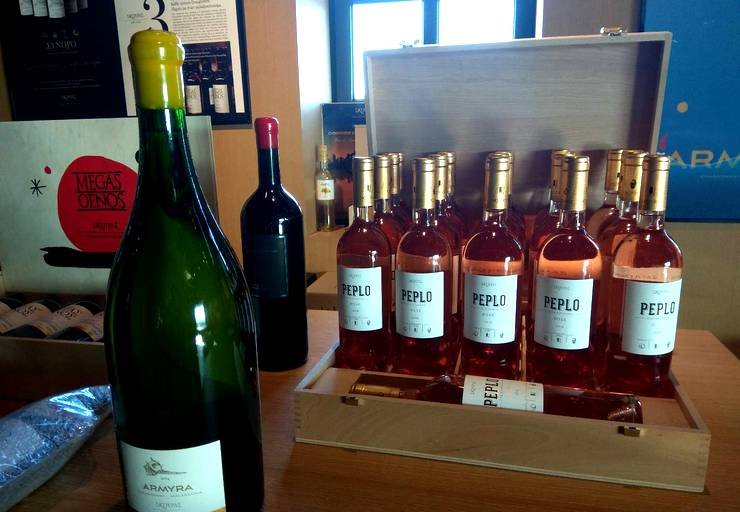
Peplo was a result of continuous research and vinifications. In order to create a modern rosé, it was important for us to emphasize its freshness and acidity. In order to achieve this, initially, the vines had to be the vines gathered at a high altitude (over 650m). Then, we had to choose a grape variety. Through the experimenting vinifications, we decided that Agiorghitiko needed to be fermented inside barrels made of acacia and sur lie, so that it would get the appropriate structure and texture and at the same time not to have too much oak. Mavrofilero is a very aromatic grape which we skin-fermented to get the most out of it and also improve its structure inside amphoras. Last, but not least – we chose Syrah to balance the blend with its lovely fruits and flowers which was fermented in stainless steel vats to preserve its delicate aromas and freshness.
We never stop experimenting with new ideas and inspiration in this winery. At the time being we are more concentrated on wines with mono-varietals.

In addition to the technical equipment at the highest level, it is necessary to draw attention to your laboratory, which, in addition to studying and monitoring, has been conducting active experiments described in the protocols in cooperation with the Liquor Control Board of Ontario (LCBO). Tell our readers about the latest research. What kind of experiments are being carried out?
Above all, we are very passionate scientists who try to control every single parameter we can think of, to guarantee the consumers’ health. We work with ETS in California, where we make all the analysis needed. It should be also pointed out that during these past few years, we have made investment into the allergen analysis to guarantee the safety of consumption.
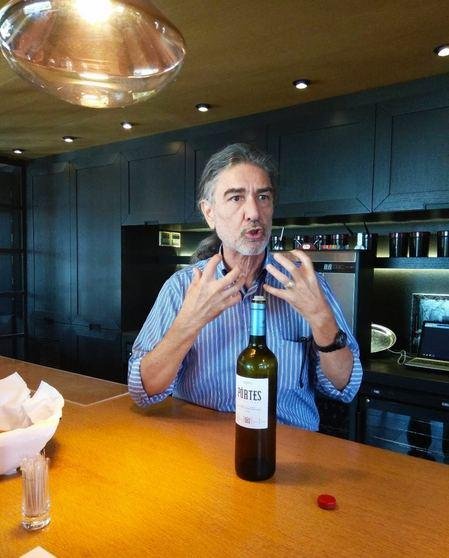
Our readers are a professional wine audience, which also includes the Ukrainian winemakers who are newcomers to the industry. Could you give some recommendations to them, perhaps, share information about the most interesting ideas in the field of technologies, and the world’s most fashionable wine techniques available nowadays?
There are no recipes for success. For us, a modern winemaker has to be up to date with every new technique in the field. Respect the tradition and work hard in the vine yards and with the wines! The world’s best winery or wine cannot do anything without people behind them.
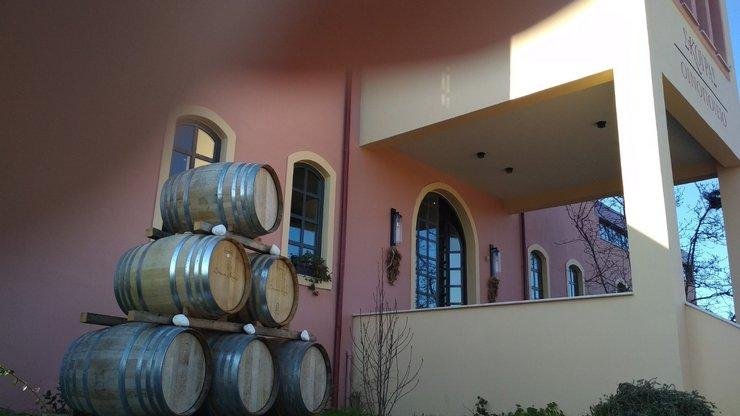
Today, you are teaching winemaking to the second generation of the family business – your two children. How do they help you at the winery? How do you share the responsibilities?
The second generation is on business and are already fulfilling numerous responsibilities. My daughter who studied economics and marketing is the manager of the marketing team and my son who has studied Wine and Agriculture takes care of winemaking and bottling. All of us do our best to keep our quality standards and we always try to become better.
Where do your children study and where would you advise, as a matter of principle, to study winemaking? In Greece, in France – at the universities or in the real-world terms?
My daughter has studied economics in Greece and did a Master’s [degree] in Marketing in Scotland. My son, who is a winemaker studied in France, but he has already worked and gained experience in different winemaking regions of the USA and Europe. Working hard, loving your job and being open to learning are the guidelines to become better.

Tell us about your team – who are these people: what education have they gained, how old are they, what is their work experience, interests?
My winemaking and agriculture team consists of 6 people who take care of the wines and the vines. All of them studied oenology or agriculture in Greece, Italy or France. They are the people who from 28 to 50 years old, that either started their work experience in this winery or have travelled and gained experience worldwide. We are a winery that loves education so all year around, my team and I take part in seminars or webinars that can make us better. The passion for good wine holds us strongly together.
How is your working day going? How often do you conduct working tastings, with whom do you consult?
My working day begins early in the morning. Every task is a pleasant challenge. Solving problems, making wine, and working on marketing. On a daily basis, I have to cooperate with all winery’s managers in order to achieve the best results and have wine tastings with the oenology team to ensure a high-quality production and make future plans for the wines.
In the interview to our Drinks+ magazine, Jancis Robinson noted that she is a huge fan of Greece: “The country produces highly distinctive wines from a rich array of indigenous grape varieties that we are still discovering”. And the Ukrainian sommelier, who is now the Head Sommelier at the London restaurant Hide, in his commentary on the trip along the Nemea wine road said: “I tasted Mavrofilero and Grande Cuvee Nemea wines – and these are the best that I have tasted during this trip”. What is going on now in the Greek winemaking? What, in your opinion, has changed over the past 5 years?
Greek winemakers are focusing more and more on the indigenous varieties that are found in each region. I am proud to say that in Greece, the knowledge of vineyard management and of the winemaking is a combination implying an excellent job done. Practicing modern techniques, but at the same time respecting our tradition has led to the creation of unique wines that cannot be found or replicated anywhere else in the world. This is the biggest advantage we have so far. We have a better understanding of the macro and micro climates of each region and we are aiming at producing high quality fruit, which, at the end, will become a high – quality wine. I would also like to mention that the international varieties cultivated in our country, are not only complimentary, but they are showing the dynamics characteristic of our land: to create the memorable wines. A very good example of that is our Viognier Eclectique, which has gained many prizes from international competitions and can be now found in many prestigious places across the globe. Nothing of the above, of course, would have happened without investing heavily into marketing and promotion of Wines of Greece, in general, and our brand, in particular.

What is currently being done to popularize the Greek wines? Don’t you think that nowadays, the promotion is lagging behind the high- quality level wines? Quite recently, it seems to us, the situation was exactly opposite.
Promoting Greek wines in the exports market is a very difficult task. Nonetheless, in recent years and especially during the economic crisis, the winemaking sector in Greece has shown great resilience and has gained the respect of the wine trade globally. While other sectors of the Greek economy recessed, we continued investing into marketing and supporting our clients. There is no denying that because of the COVID-19 the priorities have changed. But, during the last 10 years the higher-valued wines have not dropped in sales, on the contrary, they are selling more. That means, that all the work we are doing has positive results and it is still growing. The perfect example of that is Qatar Airways, one of the most expensive and well-known Airway Companies, who selected last year our Nemea Grande Cuvee among many wines, from different countries, to offer it to their first-class customers.
The world’s best winery or wine cannot do anything without people behind them.
At the same time, according to our observations, the prices for Greek wines have been reduced, despite their quality enhancement. Is it a real fact?
We believe that we have become more competitive on the global wine stage, but we are always having in mind the uniqueness of our products. We know that we cannot compete with traditionally strong countries like France, Spain and Italy, but we are gaining more and more attention. In general, we believe that we have a better understanding of the global wine trade and we act accordingly, proving that boutique wines may be equally charming.
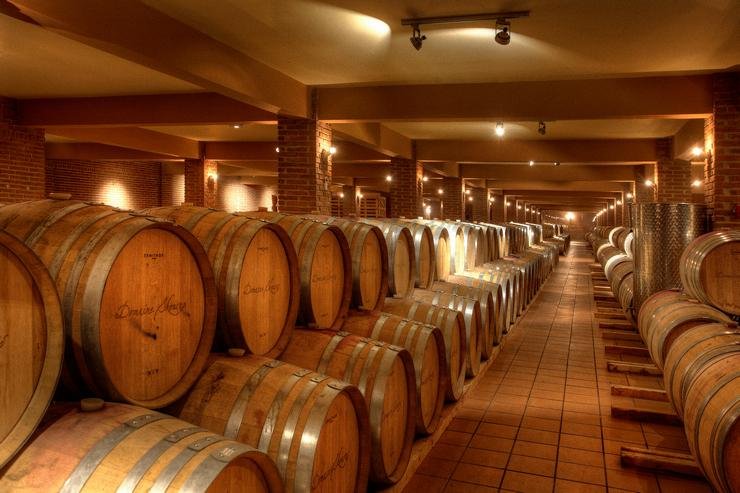
You are actively working with autochthons: you have planted small experimental vineyards with Greek varieties that are on the verge of extinction. Tell us more about these varieties. Are there any programs to promote these wines in the world markets?
Authochthon varieties are a part of our country’s wealth and history. My team and I are working the last 13 years with Mavrostyfo variety. The results are impressive and the abilities that this variety offers to us are numerous. Thankfully, there are many programs promoting Greek wines and its particularities.
Are climate changes perceptible for wine styles? Which variety, in your opinion, is the most susceptible to modifications, changes? Which of the Greek autochthonous varieties is gaining special attention in the world market? Which one is underestimated, in your opinion?
Climatic changes are real, but we haven’t felt their strong impact yet. Saying that, we are actively looking to find ways to slow down that effect, such as increasing the plantings at higher altitudes, searching for clones that are more resilient in dry and hot conditions and changing the canopy management. Agiorghitiko is definitely a variety that offers many possibilities. It can give amazing results in different circumstances and therefore, for us, it is a great tool. On the other hand, Moscofilero, like every aromatic variety, does not like big changes and is more difficult to adapt. Assyrtiko has gained most of the attention in the world market and it deserves it. It is an amazing variety, which has become very famous among the wine lovers and professionals, due to its high quality and uniqueness, especially when it comes from the island of Santorini. Nowadays, you can find amazing wines from the mainland, too. For many years we were feeling that Agiorghitiko had not gained the fame and the attention it deserves. But we are happy to report that this is changing now. The demand for this variety is higher than ever and continues to grow. It is such a dynamic variety, that can be used to produce various wines: from amazing every-day drinking wines, up to age-worthy and memorable bottles.
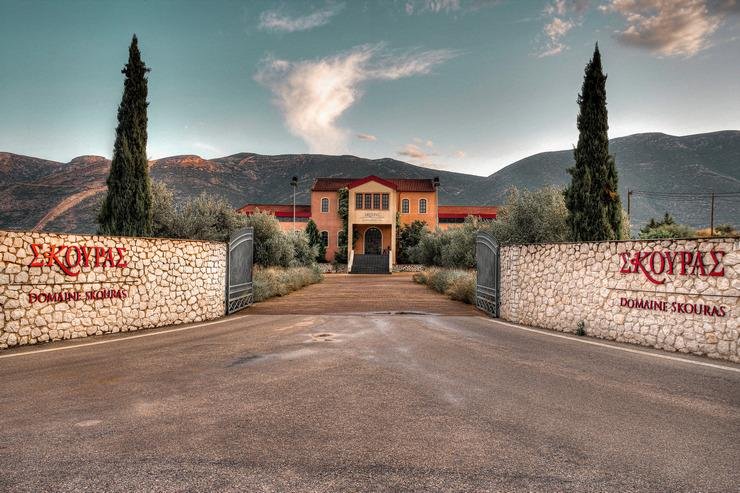
Domaine Skouras produces 700,000 bottles of wine per year. About 40% of them are exported to the world market. What are the main importing countries? Will the distribution change due to the pandemic?
Actually, our annual production is now around 850,000 bottles and it is almost 50% that is exported in more than 20 countries. USA, Belgium and Germany are traditionally the biggest markets for us. The distribution has expanded during the pandemic, as many opportunities arose in the countries to which we haven’t exported before. Also, as the purchase of wines has also changed (restaurants closed) we focused more on retail and the impact of COVID-19 was much less for us. We believe that this trend will continue to grow after the pandemic because people have noticed that it is an easy, convenient and undoubtedly quick [way of purchasing].
Are you considering steps to promote your wines in the Eastern European markets?
The Eastern European market is a market that we have been looking at for many years now. In the last couple of years, we have started collaboration projects in Ukraine, Romania and Estonia. We have found opportunities in other countries such as Lithuania, Bulgaria, Poland and Latvia and, of course, Russia, which is always on our radar. We believe that more opportunities will arise in the next few years, as the interest is growing and more activities are taking place such as wine fairs. It should be also emphasized that the Greek authorities based in these countries are doing a great job promoting the Greek products.